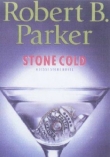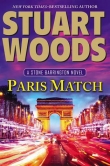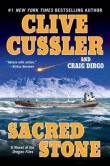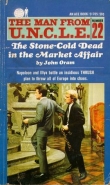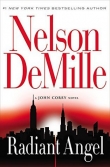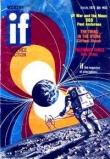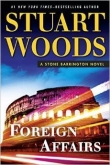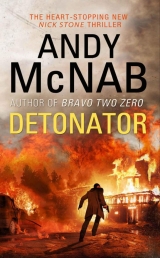
Текст книги "Detonator"
Автор книги: Andy McNab
Жанры:
Триллеры
,сообщить о нарушении
Текущая страница: 20 (всего у книги 23 страниц)
11
My pulse rate barely altered during a contact, or even when I was tabbing across high ground in hostile territory. But my heart was doing its best to fight its way out of my ribcage right now. I opened my mouth, slowed my breathing and gripped myself.
‘OK. He say anything else? He have any idea where they might be?’
‘He will leave no stone unturned, you know that.’ Luca was trying to sound as upbeat as possible, but I could tell he was in pieces. ‘He’ll be asking everyone in the surrounding area for …’
He kept talking, but I stopped listening.
I needed to focus.
Dijani would have had Frank’s laptop within hours of his death. If they’d cracked the password and taken her and the baby before I picked up Hesco, that fucker would have told me. He’d have used them to save his own skin.
Maybe Luca’s geek was a magician, and Dijani’s guys were still scratching their heads and failing to gain access to Frank’s files.
Maybe they hadn’t taken them.
Maybe Mr Lover Man hadn’t given them her name, or told them Anna and Nicholai were my weak point.
Maybe Anna had found a different bolthole.
But ‘maybe’ wasn’t good enough.
I had to work on the assumption that whichever safe house Anna had chosen had stopped being safe at least seventy-two hours ago.
‘Where were they? The safe houses.’
‘One east of Ternopil. One south of Vinnitsa.’
That made sense. It was Frank’s home turf.
‘Will you go there, Nico?’
‘No.’ I felt my head shake, as if that was helping. ‘Dijani will know where they are. And Minerva is still my best chance of finding him.’
My mission had changed. My target hadn’t.
‘We heard she left Patras four hours ago.’
It was 17:42 now. I got my brain in gear on some numbers. They would frame my actions between now and first light tomorrow. And doing the sums was a good way to avoid thinking about the shit Anna and our son might be in.
Patras was 330 nautical miles from Brindisi, give or take.
Minerva was fresh off the slipway, so should be able to do at least twenty-two knots fully loaded, more if not.
Which meant I had between eight and fourteen hours to locate the fucker.
‘OK, listen in. They won’t drop anchor offshore at the height of the trafficking season. The coastguards would be all over it. And it’s not booked into any of the main Italian terminals. I’ve covered every fucking centimetre of the coast between Brindisi and Taranto, and there’s nowhere it could get into without drawing attention to itself. So I’m going north. I’m starting with Monopoli. You know it?’
‘I’ve never been there.’
‘Can you Google it?’
I could hear him tapping at his keyboard. He gave me a running commentary as he scrolled down the imagery. ‘Old town … beach … swimmers … more swimmers … ancient wall … parasols … swimming-pool … map … trulli … No, that must be a shot of Alberobello …’
I didn’t know what the fuck he was talking about.
‘… church … more parasols … fish … Pippa Middleton at a wedding … fishing boats … no cargo ships yet … more Pippa—’
I was about to tell him to shut the fuck up about Pippa Middleton when he got excited about a big ship – a tanker or a container vessel – and a crane.
‘But only one photograph.’
I told him I didn’t give a shit: one was good enough for me.
‘Nico … I … Anna …’
‘Luca, no need, mate. Really.’
At times like this, you have to cut people away. I needed him switched on. I didn’t want him to take up time or get emotional.
‘But I still need your help. I’m not going to bin this mobile. Call or text if you get any updates about Anna, Dijani, the Urans, Minerva, or any other shit I need to know. And if I find the fucking thing, I’ll call you.’
I powered down and shoved the mobile into my jeans. If I got tracked down, so what? At least I would be one step closer to Dijani.
I just needed it to be on my terms, not his. I had to be in control of what happened next.
This wasn’t just about me any more.
12
A short avenue of cypresses led up to the Monopoli graveyard. Its whitewashed outer walls and the two sets of columns on either side of a heavily barred entrance made it look like a barracks built to withstand a full-scale infantry attack. I passed it on my way to the headland immediately to the south-east of the old town.
I skirted a couple of small sandy bays filled with locals and tourists enjoying the late-afternoon sun, and parked up on the far side of a pizza restaurant that looked like it had seen better days. I bought a litre of mineral water and a slice of something that had been pattern-bombed with cheese, tomato and peperoni, and started on it as I walked out to the nearest spit.
I found a place among the rocks that gave me cover, swallowed the last bit of crust and got some liquid down my neck before bringing out the binos. The map had delivered on its promise of a good, uninterrupted view of my target.
This wasn’t the playground of the super-rich, so the water wasn’t stuffed with jet skis and luxury yachts and perma-tans. Two or three teams of rowers were working up a sweat close to the opposite shore and there was the odd swimmer and marker buoy, but that was it.
From this angle, Monopoli looked like a fantasy travel poster – a combo of blindingly white and light brown buildings, framed by the deep blue-green of the sea and the paler blue of the sky. As I scanned the place left to right, my view was dominated by the cathedral, a pair of massive old factory chimneys, another huge church and a neat little fortress that guarded the harbour mouth.
Then the thing I was really here for: the stone dock that Luca had Googled. It doubled as a breakwater and had two cargo vessels parked up alongside it. Neither of them had ‘NETTUNO’ painted across their flank, but there was room for a third, and maybe even a fourth.
There was no sign of a gantry or any kind of storage facility, but two smart yellow tower cranes and a third hoist, half their size, mounted on caterpillar tracks, stood against the back wall, ready to swing into action.
I lowered the binos and ran them along the surviving segment of the ancient fortifications. Part of it had been converted into what looked like a boutique hotel, with white parasols lining the battlements. I checked out the balconies in case Dijani and the Uran brothers were using it as their operating base. They were both deserted. A couple of lads with bellies overhanging their shorts gutted octopi in a rock pool beneath them.
A circular cannon emplacement jutted out between the hotel and the fortress. A red-and-white-striped mini-lighthouse and what looked like a Second World War bunker stood at the end of the quay a hundred to its right.
I moved across to the other side of the spit. A lone fishing boat was chugging out to sea. A couple of passenger ferries steamed along the horizon, heading for Bari, I guessed, or maybe further north. There wasn’t a single container in sight.
I wandered back to the Seat, wrapped the passports, IDs and money in a plastic bag, pocketed the torch and left the day sack in the boot. The bag went under a rock at the edge of a patch of scrub twenty paces from where I’d parked. Then I took the boardwalk around the edge of the first bay.
I was crossing the outcrop that separated it from the second when the Nokia vibrated in my pocket.
‘Nico, we have traced Dijani’s hotel bookings for last night, tonight and tomorrow. All five star. All paid in advance. In six different locations: Otranto, Brindisi, Bari, Ancona, Ravenna and Venezia.’
‘Pretty much every major port on the Adriatic.’
‘Correct.’
‘Not Monopoli?’
‘Not Monopoli.’
‘Has he checked into any of them?’
‘Not so far.’
‘So he’s fucking about.’
‘Looks like it.’
‘I’m sticking with Plan A. Unless you get a firm sighting of either Dijani or the boat somewhere else.’ I didn’t have a choice. There was no way I could keep rocketing up and down the coast in the hope that I might get lucky. And this place ticked all the boxes.
I slipped off my jacket and hooked it over my shoulder as I joined a random group of punters coming off the beach. I nodded and smiled at a succession of complete strangers whenever I needed to look like someone whose top priority was to find a nice place for a beer.
The walkway beneath the hotel balconies was completely in shadow now. Even the octopus fishermen had pissed off. I stayed with the crowd and turned right, down a paved street that ran along the town side of the old wall.
Every so often cars and slow-moving delivery vehicles crept up behind us, but mostly they were too polite to tell us to get the fuck out of their way.
I ducked into a shop that advertised everything from holiday rentals to Internet access on the door and grabbed a couple of maps – a large-scale street plan of the old town and one of the whole city.
Immediately past the boutique hotel there was a small piazza with parking on each side. The road narrowed again by an apartment block shrouded in scaffolding and tarpaulin sheets, which all looked like they belonged in a different century. A series of poles jutted out from the uprights at forty-five degrees, five metres above the pavement. They supported an awning of timber planks designed to protect people passing below from falling masonry or falling workmen.
The road forked left into another maze of alleys. I carried on right, towards the harbour.
I could see a load of moorings through an archway ahead of me. The fortress that stood beside it seemed a good place to recce what – if I was right about Minerva – would become the heart of the action. It was hosting an exhibition of local painting and sculpture and didn’t shut its doors until 21:00, so I followed a young Brit couple up through the cool, dimly lit interior.
None of us bothered much with the artwork.
As soon as I reached the top of the stone ramp on to the battlements, I knew it was the perfect vantage-point. I was one of a dozen or so visitors there to admire the three-sixty-degree view. There were five pairs of binos on display, so I fitted right in. As far as I could tell, none of them belonged to the Albanian Mafia.
This time I began by looking out to sea. Three more fishing boats, and a liquefied natural gas tanker on the skyline. I swept my Pentax anti-clockwise until I hit the first of the vessels at the cargo quay, then the second.
I was looking for three things.
An access route to that section of the port.
Possible locations for Dijani’s forward operating base.
And any sign of him and the Urans.
Apart from the two uniforms by the gated entrance, there was nobody around.
I quartered the area around their glass-fronted kiosk.
A brand new security fence both sides of the gate.
A roundabout opposite.
Then two apartment blocks, maybe more.
I followed the fence left. It ran along the top of a high stone wall, which dropped into the water. I followed it right, to where it was set into the sea defences that backed on to the quay. Where metal met stone I could see a pile of those huge concrete cubes they dumped on the seaward side to create a barrier against the waves.
All I was missing was any visible proof that I’d made the right call by being there.
What if I’d ticked the wrong boxes? As the possibility of a terminal fuck-up filled my head, I lowered the binos and gave myself a mental slapping. Nobody ever said this shit was easy. There was no formula for guaranteed success – you just had to work with what you had – but right now I really, really wished there was.
I took a couple of deep breaths and wiped the binos on my shirt.
My next focal point was the boatyard in the shadow of the factory chimneys. Boats in the water. Boats on trolleys and in cradles and on stilts all over the hard standing. Bits of boat lying around on the ground, and in the darkened doorways of wriggly-tin workshops. Loads of chaos. Loads of cover. Definitely worth a closer look too.
Further left, about a hundred from the fortress, there was a wide concrete slipway at the inner, most sheltered edge of the harbour. It ran down towards a pontoon, which bordered a stretch of water where the rowing boats tied up. And that was when I saw Elvis Uran for the fourth time in six days.
He’d binned the suede jacket with the sharp lapels but stuck with the black satin shirt, skinny black jeans and snakeskin boots. He looked like he was planning to star in the remake of The Magnificent Seven.
I didn’t see his face at first, just the top of his freshly polished head. He was leaning over the edge of the pontoon and, judging by his body language, giving a set of instructions to a guy in one of the rowing boats. As soon as he stood up and stepped back on to the quay, I wasn’t in any doubt. He had one of those don’t-fuck-with-me walks that was never designed to help him blend in.
Elvis skirted the edge of the slipway and swaggered off through an arched passage that provided a shortcut into the centre of the old town. He was silhouetted briefly against the sunlight on the street beyond it, but long enough to show me that he was going left.
I put on my jacket and tucked the binos into a side pocket as I moved back down through the fortress.
The large-scale map told me that my best chance of catching up with the Albanian was to avoid the harbour route and go left, then first right as soon as I was outside.
I couldn’t sprint through those paved streets: it wasn’t that kind of place. But I had to move fast. I was fucked if Elvis took either of the turnings towards the main square, which had six exits, or the museum, which had seven.
By the time the Via Orazio Comes had become the Via Barbacana I’d spotted the back of three very shiny heads, but not the one I was after. I jinked past the cathedral, sweat now falling from my forehead, and found myself at the edge of a more modern, tree-lined piazza. I glanced at the queue of people waiting to buy ice cream at a place called Café Roma, and saw Elvis coming out of it with two brightly coloured scoops balanced on a cornet.
13
I slowed down and gulped some air.
He wouldn’t have seen me at Aix or at the construction site between St Gallen and Zürich where I’d dumped his brother. I’d worn a full-face motorbike helmet outside Laffont’s bank in Albertville. And if Mr Lover Man had given Dijani and the Urans the world’s most accurate description of me, it would have been all over the Internet. So I reckoned Elvis wouldn’t ping me unless I made it obvious I was on him.
Keeping the back of his body in view every step of the way, but not risking eye to eye, I walked over to the newspaper kiosk opposite the café and bought a packet of gum, then spent a few minutes checking out the magazine selection – long enough for him to cross the square and take the street that led over the railway track to the cemetery and the main routes out of town.
He didn’t look right or left, just slowed when the red lights flashed, the bells began to ring and the barriers went down at the level crossing for an approaching train.
I looked into a flower-shop window, keeping eyes on his reflection. I needed an excuse to delay my arrival at the level crossing, and an obvious reason for being there.
A goods train rattled past. The barriers came up again when I was still twenty away and Elvis strode across the track with a small cluster of locals, who then split up at the main. The side wall of the graveyard ran for a couple of hundred along the left side of the road. There was a field of long grass and wild flowers to its right.
He turned half-left into the cypress avenue that led to the grand entrance. I half expected him then to go right and right again and end up coming back towards me – the sort of thing I’d done last night in Naples to check if I really was being followed by the low-budget Mafia.
He went left and was unsighted along the far boundary. I followed, hugging the rendering as I got to the corner. There was no road here, just a rough path snaking through bushes and trees.
The path wasn’t well trodden enough to make my presence on it a happy coincidence. So I had no choice but to hang back. He was soon halfway along it, beneath a couple of hefty branches that overhung one of the buildings immediately inside the plot. When he got to the end of it, he became unsighted again. I got one foot in front of the other as fast as I could to get him back into view.
I eased up as I came within reach of the track that ran behind the city of the dead. When I got there, I sneaked a glance in both directions. No sign of Elvis to my right, at the back of the plot. Then I heard voices and saw movement in a rusty metal and timber barn a hundred along the track to my left. I stepped back into the bushes and kept eyes on the yard in front of it.
As far as I could make out, there were three of them in there, and a blue Fiat three-ton truck. I pulled out the binos. All I could see was one shiny head and two shadowy figures. Then an engine sparked up. But not the truck. Something inside the barn. A grinding of gears, then the whisper and whoosh of hydraulics.
I bent low and crossed the track into another patch of wasteland. Trees and spiky bushes gave me cover three-quarters of the distance to my target. The noise gave me the opportunity to move in closer. I got down on my belt buckle and crawled the rest of the way, pumping with my knees and elbows in the cover of the rough meadow grass and rampant weeds. Thank fuck it hadn’t rained there in a while. I had some dust to contend with, but no mud.
The yard was surrounded by a breezeblock wall that had been whitewashed sometime in the previous century. It was about chest high and topped off with a rusty metal railing. As I drew nearer, the pitch of the engine changed and a small mobile crane rumbled out of the barn and came to a standstill with a hiss of air brakes.
The lad in the cab extended and contracted its hoist, rotated it one-eighty, then repeated the whole performance. He wasn’t wearing L plates, so he must have been testing the machine as much as his own skills.
Elvis and his mate on the ground clapped their hands. They seemed to be enjoying the show. And neither of the others looked remotely like George Michael.
The driver reversed back under the wriggly-tin roof and everything shut down.
I heard voices again. Banter. Even a laugh or two.
Elvis came out of the yard and began to retrace his steps down the track. The other two stayed inside with the vehicle. I lay flat by the base of the wall until he had passed. Then I ran at a crouch to the rear of the barn, paralleling him as far as the turning, and followed him back the way we had come.
This time Elvis hung a left before the railway. I stayed on the opposite side of the road as he skirted a massive walled area, part sunken olive grove, part lemon orchard.
The shadows were lengthening. The sky was darkening. Streetlights flickered on. But I didn’t plan to lift him. Not yet, anyway. You don’t snatch the monkey when you’re hoping he’ll lead you to the organ-grinder.
He took a right past a building site, which I realized was the back of Monopoli Hospital, and disappeared into a pedestrian tunnel beneath the track in front of it.
When I got there, it was empty, except for faded splashes of graffiti and three low-wattage lamps. I broke into a run and sweat soon stuck my jeans to my legs like it was trying to stop me moving. I caught a glimpse of Elvis as I climbed out on the far side. He was heading towards the factory chimneys, but before he got to them he quickened his pace and hung a right.
I followed him into a street with a bunch of small-time marine workshops on one side and the boatyard I’d seen from the fortress straight ahead. The gates were shut and there were no lights visible inside. I hung back while he brought some keys out of his skinny jeans, opened it and locked up behind him. He melted into the darkness.
Staying in the shadows, I moved closer to the iron bars. There was a fair amount of ambient light reflecting across the surface of the harbour. I could see a two-storey admin building immediately to my left, firmly shut, and a ribbon of clear concrete curving around behind it.
The rest of the hard standing was filled with a fuck of a lot of boats on stilts, in the process of having their hulls cleaned or their propellers serviced or whatever you do when you lift these things out of the water. Every centimetre of space beneath them was covered with engine parts, chunks of timber and bits of rope. Health and Safety would have loved this place.
I didn’t think you could get to the main cargo quay from there, but you’d be able to keep it under close observation, for sure. Was this Dijani’s forward operating base, or just a vantage-point?
Keeping close to the wall, I stopped, opened my mouth and did the listening trick. All I could hear was the lapping of waves and the metallic clink of whatever boats have in their rigging. I gripped a vertical bar of the gate with each hand and wedged the toe of my boot on the central rail. Then I pulled myself up high enough to be able to grab a couple of the spikes on top and managed to haul myself over them without spearing my bollocks or making it creak or clang.
I dropped almost silently to the ground, listened again, and scanned the area ahead of me for the shape, shine, shadow, silhouette, spacing and movement that indicated the presence of a body in a world of inanimate objects.
Nothing.
I edged across to the first of the boats on stilts, three metres to my half-right, and ducked under it. Keeping low and steering clear of the shit that littered the ground beneath my feet, I worked my way towards the centre of the yard.
After five or six paces I spotted a nice heavy wrench that had been left beside a bunch of dismantled engine parts. I stooped and picked it up, getting a waft of diesel fuel at the same time. I gripped its handle and moved on.
An open-fronted workshop to my left.
The cranes on the cargo quay to my right, like dinosaur skeletons, reaching into the night sky.
Just one vessel tied up between them now. The lamps on the stone wall behind it cast a weak, sulphur-yellow glow, but even at this distance it was enough to backlight the masts and keels and oil drums and a couple of abandoned fridges that separated me from the harbour.
And the big-wheeled gantry that they obviously used to heave all this shit in and out of the water.
And the body standing next to it, stock still, binos glued to his eyes, focused on the open sea.

